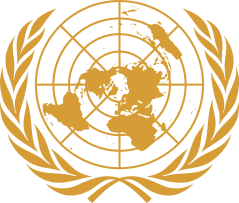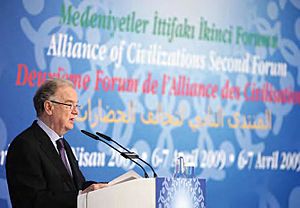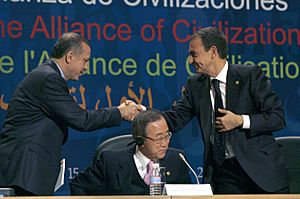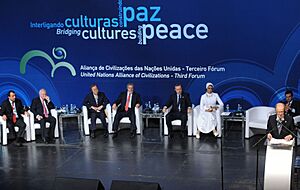United Nations Alliance of Civilizations facts for kids
Quick facts for kids  United Nations Alliance of Civilizations (UNAOC) |
|
|---|---|
 |
|
| Org type | United Nations entity (multilateral) |
| Status | Active |
| Headquarters | New York City |
The United Nations Alliance of Civilizations (UNAOC) is a special group within the United Nations. It works to bring people together from different cultures and religions. Its main goal is to stop extreme ideas and build understanding around the world.
UNAOC especially tries to ease tensions between Western countries and the Islamic world. It believes that talking and working together can solve many problems.
The idea for UNAOC came from the Prime Minister of Spain, José Luis Rodríguez Zapatero, in 2005. He suggested it at a big meeting of the United Nations. The Turkish Prime Minister, Recep Tayyip Erdoğan, also supported the idea.
On July 14, 2005, the UN Secretary-General, Kofi Annan, officially started the Alliance of Civilizations. Spain and Turkey helped launch it.
In November 2009, the United Nations General Assembly officially recognized UNAOC's work. They passed a resolution that supported its efforts to promote understanding and tolerance. This showed how important intercultural and interreligious talks were.
By July 2015, UN member countries showed even more support. They passed another resolution, confirming UNAOC as a key part of the United Nations system. This meant UNAOC was an official initiative of the UN Secretary-General.
Contents
- How UNAOC Works
- Why UNAOC Started
- Key Focus Areas
- UNAOC Global Forums
- 10th Global Forum: Cascais, Portugal (2025)
- 9th Global Forum: Fez, Morocco (2022)
- 8th Global Forum: United Nations Headquarters New York (2018)
- 7th Global Forum: Baku, Azerbaijan (2016)
- 6th Global Forum: Bali, Indonesia (2014)
- 5th Global Forum: Vienna, Austria (2013)
- 4th Global Forum: Doha, Qatar (2011)
- 3rd Forum: Rio de Janeiro, Brazil (2010)
- 2nd Forum: Istanbul, Turkey (2009)
- 1st Forum: Madrid, Spain (2008)
- Recognition
- See also
How UNAOC Works
Leadership and Roles
The main leader of UNAOC is called the "High Representative for the Alliance of Civilizations." This person helps guide the group and speaks for it. They work closely with the Secretary-General of the United Nations. The High Representative holds a high rank, like an Under-Secretary-General.
In April 2007, Ban Ki-moon, who was the UN Secretary-General then, chose Jorge Sampaio for this role. Mr. Sampaio used to be the President of Portugal.
Later, in February 2013, Nassir Abdulaziz Al-Nasser became the High Representative. He had been the President of the United Nations General Assembly.
In January 2019, Secretary-General Antonio Guterres appointed Miguel Ángel Moratinos as the High Representative. Mr. Moratinos was once the Minister of Foreign Affairs for Spain.
In 2023, Nihal Saad became the Director of UNAOC. She was a TV journalist from Egypt. Before becoming Director, Ms. Saad worked as the Chief of Cabinet and Spokesperson for the High Representative.
The UNAOC also has a team called the Secretariat. This team helps the High Representative and carries out UNAOC's projects.
Where UNAOC is Located
The main office for the United Nations Alliance of Civilizations is in New York City. It is located at the United Nations campus. In 2021, UNAOC opened a second office in Geneva, Switzerland, at the Palace of Nations.
Why UNAOC Started
UNAOC was created because leaders noticed a growing problem. They saw that people from different cultures and religions, especially Western and Islamic societies, were becoming more suspicious of each other. This misunderstanding could lead to serious problems, even violence.
Many political leaders believed it was important to find common ground. They wanted to build respect and understanding between different groups. The goal was to stop "extremism" and create a peaceful world where everyone could live together.
The Spanish Prime Minister, José Luis Rodríguez Zapatero, first suggested this idea at the UN in 2005. The Turkish Prime Minister, Recep Tayyip Erdoğan, supported him. They wanted to find practical ways for UN member countries to work together.
To achieve this, UN Secretary-General Kofi Annan formed a special group. This "High-Level Group" had 20 important people. They came from different backgrounds, including politics, education, religious leadership, and media. They represented many religions and cultures.
Some famous members included former Iranian President Mohammad Khatami and Nobel Prize winner Archbishop Desmond Tutu. This group met several times between 2005 and 2006. They focused on improving relations between Western and Muslim societies.
The High-Level Group's final report came out in November 2006. It gave recommendations on how to solve misunderstandings. The report stated that "politics, not religion, is at the heart of growing Muslim-Western divide." However, religion was still a big focus.
The report also pointed out four key areas for UNAOC to work on. These areas are important for reducing tensions and building bridges between communities. They are: Youth, Education, Media, and Migration.
In May 2007, UNAOC released its "Implementation Plan." This plan explained that UNAOC would work with existing groups and projects. It would focus on partnerships and projects in the four key areas. The plan also included ideas for annual forums and a "Group of Friends" from different countries.
Key Focus Areas
UNAOC works on several important areas to achieve its goals.
Media
Media, like news and social media, greatly influences how people think. UNAOC uses media to help bridge cultural gaps. It teaches people how to understand information better. It also trains journalists to report fairly and accurately.
Youth
Young people are very important for making positive changes in the world. They bring new ideas, energy, and passion. UNAOC helps young people around the globe through education and training. It sees them as powerful leaders for social change.
Education
Education helps prepare young people for a world where everyone is connected. Learning about your own history is important, but so is understanding other cultures. Education, including art, music, and sports, can connect people. UNAOC's education programs help people learn to think critically and understand different cultures. This helps fight stereotypes and intolerance.
Migration
Many people move from one country to another. This creates new challenges but also new opportunities. UNAOC's migration programs work to create welcoming societies. These societies respect the human rights of all people, no matter where they come from.
Women as Peace Mediators
The current High Representative, Mr. Moratinos, wants to add "women as peace mediators" as a new focus area. The United Nations believes that including women is key to preventing conflicts. They want to involve women leaders in efforts to make peace.
UNAOC Projects and Initiatives
UNAOC runs many projects to achieve its goals:
- UNAOC Youth Solidarity Fund
- UNAOC Fellowship Programme
- UNAOC Young Peacebuilders
- Intercultural Innovation Hub (IIH) (with BMW Group and Accenture)
- PLURAL+ Youth Video Festival (with IOM)
- Sport for One Humanity initiative (with Turkish Airlines)
- News Generation Against Hate (with La Courneuve)
- Promoting the Role of Women as Peacemakers
- EDIN: Empowering Dialogue and Interfaith Networks (with UNOCT)
- Intercultural Leaders and Alumni Engagement (with BMW Group)
- Youth Waging Peace
- Digital Games for Peace
- #SpreadNoHate Initiative
- PEACEapp
- Media and Information Literacy
UNAOC Global Forums
UNAOC holds regular "Global Forums." These are big meetings where leaders, organizations, and people from different communities come together. They work on partnerships and make plans for action.
UNAOC held its first Global Forum in Madrid, Spain, in 2008. Since then, it has organized many more forums around the world.
10th Global Forum: Cascais, Portugal (2025)
The 10th Global Forum of UNAOC took place in Cascais, Portugal, from November 25-27, 2025. The theme was "United in Peace: Restoring Trust, Reshaping the Future — Reflecting on Two Decades of Dialogue for Humanity."
9th Global Forum: Fez, Morocco (2022)
The 9th Global Forum was held in Fez, Morocco, from November 22-23, 2022. The theme was "Towards an Alliance of Peace: Living Together as One Humanity." Over 2,000 people from 136 countries attended. These included leaders, organizations, youth, and media.
8th Global Forum: United Nations Headquarters New York (2018)
In 2018, UNAOC held its 8th Global Forum at the United Nations Headquarters in New York City. The theme was "#Commit2Dialogue: Partnerships for Prevention and Sustaining Peace."
7th Global Forum: Baku, Azerbaijan (2016)
Azerbaijan hosted the 7th UNAOC Global Forum in Baku from April 25-27, 2016. The theme was "Living Together In Inclusive Societies: A Challenge and A Goal." This forum focused on how leaders, civil society, and businesses can promote inclusion and prevent violent extremism.
6th Global Forum: Bali, Indonesia (2014)
The 6th Global Forum of UNAOC was held in Bali, Indonesia from August 29-30, 2014. Its theme was "Unity in Diversity: Celebrating diversity for common and shared values."
5th Global Forum: Vienna, Austria (2013)
The fifth Global Forum of UNAOC was held in Vienna, Austria in 2013.
4th Global Forum: Doha, Qatar (2011)
The 4th Global Forum of UNAOC took place in Doha, Qatar, from December 11-13, 2011. More than 2,000 people attended. They worked together to find ways to improve relations between cultures and build lasting peace.
3rd Forum: Rio de Janeiro, Brazil (2010)
From May 27-29, 2010, over 2,000 people met in Rio de Janeiro, Brazil. The theme was "Bridging Cultures, Building Peace." They discussed important questions like how to fight intolerance and how media can help connect cultures.
The forum led to new projects. These included "Dialogue Cafés," which use video calls to connect young people globally. They also launched a Global Youth Movement and an Online Community on Migration and Integration.
2nd Forum: Istanbul, Turkey (2009)
The second Forum of the Alliance of Civilizations was held in Istanbul, Turkey, on April 6–7, 2009.

Nearly 2,000 people attended, including government leaders and ministers. They worked on new partnerships and ideas to build trust between different communities. The forum also showed off UNAOC's ongoing projects.
New initiatives were launched, such as "Education about Religions and Beliefs" and the "Alliance Fellowship Program." UNAOC also made agreements with several international groups.
1st Forum: Madrid, Spain (2008)
The first forum of the Alliance of Civilizations was held in Madrid, Spain, on January 15–16, 2008. Over 900 people from 78 countries attended.

Spain hosted the forum. Leaders, scholars, and public figures from around the world met. They looked for new ways to bridge divides between nations and cultures. They also started new partnerships to promote global understanding.
The forum announced several new projects. These included media and education programs to help UNAOC's goals. UNAOC also signed agreements with organizations like UNESCO and the League of Arab States.
Recognition
In 2007, UNAOC received the "Dialogue of Civilizations" award. This award was given by the Rumi Forum and Georgetown University. Spanish Prime Minister José Luis Rodriguez Zapatero and Turkish Prime Minister Recep Tayyip Erdoğan accepted the award.
See also
 In Spanish: Alianza de Civilizaciones para niños
In Spanish: Alianza de Civilizaciones para niños
 | William L. Dawson |
 | W. E. B. Du Bois |
 | Harry Belafonte |


